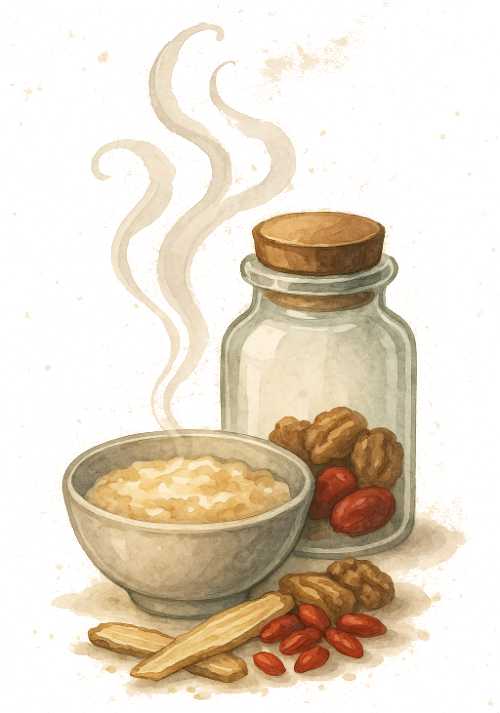Daily Self-Care for Arthritis:
A TCM-Inspired Approach
Living with arthritis means managing more than just pain—it requires paying attention to how your whole body responds to weather, diet, rest, and stress. While acupuncture and herbal therapy can play a key role in long-term support, traditional Chinese medicine (TCM) also places great value on daily habits. In fact, many small adjustments made throughout the day can ease joint discomfort, reduce flare-ups, and help you feel more in control of your health.
One of the most important principles in TCM is that pain often comes from blockage—when the flow of Qi and blood is disrupted in the channels. This can happen for many reasons, but cold, dampness, and stagnation are common culprits. That’s why prevention and protection are central to TCM arthritis care.
Keep the joints warm
In Chinese medicine, exposure to cold and dampness can cause Cold Bi or Damp Bi—two common arthritis patterns. Wearing gloves in cold weather, covering the knees, and avoiding sitting on damp ground or directly under a fan are simple but meaningful habits. A warm bath or a heating pad applied to the affected joints can also help open the channels and reduce stiffness.
Move regularly, but gently
Too much stillness leads to stagnation; too much intensity can cause strain. TCM encourages consistent, moderate movement. Morning stretching, short walks, or gentle exercises like Taiji (tai chi) or Qigong can keep qi flowing and reduce joint stiffness. These forms also emphasize coordination and awareness, helping to prevent injury and build strength gradually.
Eat warm, easy-to-digest foods
The spleen plays a central role in TCM digestion and the transformation of food into energy. Cold or raw foods are thought to impair its function and create internal dampness, which may worsen joint symptoms. Soups, steamed vegetables, and well-cooked grains are typically better choices than smoothies or salads, especially in cooler seasons.
Rest is as important as movement
Joint pain often flares when the body is overworked or sleep is lacking. TCM views rest as a way to replenish Yin and Blood, which nourish the joints and muscles. Going to bed before 11 p.m., avoiding overexertion, and pacing activity throughout the day are all ways to support recovery and reduce inflammation.
Protect your emotional balance
TCM acknowledges that emotional stress—especially frustration or internal tension—can contribute to pain by disrupting the smooth flow of Qi. Carving out quiet time, practicing deep breathing, or simply walking outdoors can help regulate the liver and reduce reactivity. Over time, even small moments of calm can lower sensitivity to pain.
These habits may seem simple, but they reflect the core of TCM’s philosophy: healing doesn’t just happen in the treatment room. It happens in the rhythms of daily life—in how we eat, move, rest, and relate to the environment. By observing the body’s signals and making small, steady changes, many people with arthritis find that their joints feel freer, their energy steadier, and their outlook more hopeful.
Vocabulary Guide
- Qi (气 qì) – The body’s vital energy, responsible for movement, warmth, and nourishment.
- Cold bi (寒痹 hán bì) – A type of arthritis pain that worsens with cold and improves with warmth.
- Damp bi (湿痹 shī bì) – A pattern of joint pain involving swelling, heaviness, or stiffness, often worsened by humidity.
- Spleen (脾 pí) – The organ system in TCM that governs digestion and transformation of nutrients into energy.
- Liver (肝 gān) – In TCM, associated with emotional regulation and the smooth flow of qi.
- Tai chi (太极 tàijí) / Qigong (气功 qìgōng) – Gentle, meditative movement practices used to promote balance, circulation, and relaxation.


